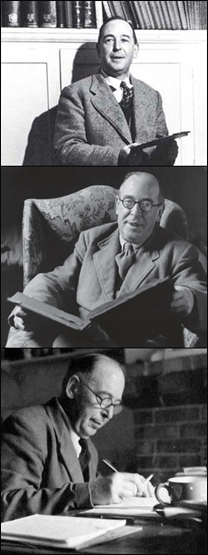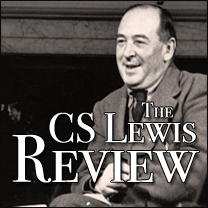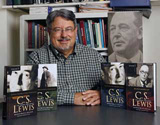
Serenity and C. S. Lewis
October 2nd, 2005 | Skip to comments
 It is dangerous to speculate on what kind of movie C. S. Lewis would or would not like. After all, he did not like movies. But he did like narrative and romance (i.e., a technical term for adventure and questing, not a reference to Harlequin novels)–and he loved science-fiction, or “speculative fiction.” He chose it as a genre he himself wished to work in. And hardly anyone at mid-century had read S/F more critically or reviewed its canon more appreciatively, or had a better idea of what did or did not work in S/F than Lewis. Quite simply, he read everything, from pulp magazine S/F to the great traditions of S/F (Verne; Wells; Clarke) as well as World S/F like that of the Soviet writer Stanislaw Lem. He disliked stories that championed any form of seemingly benign human colonization in outer space as if to spread the shame and sin of humankind to other planets–or any kind of scheme that placed survival of the human species above all, even to the extent of “conquering” other worlds. He took human fallenness seriously and would not revel in a story whose plot allowed vain and vicious men to achieve in space what they could not do on Earth.
It is dangerous to speculate on what kind of movie C. S. Lewis would or would not like. After all, he did not like movies. But he did like narrative and romance (i.e., a technical term for adventure and questing, not a reference to Harlequin novels)–and he loved science-fiction, or “speculative fiction.” He chose it as a genre he himself wished to work in. And hardly anyone at mid-century had read S/F more critically or reviewed its canon more appreciatively, or had a better idea of what did or did not work in S/F than Lewis. Quite simply, he read everything, from pulp magazine S/F to the great traditions of S/F (Verne; Wells; Clarke) as well as World S/F like that of the Soviet writer Stanislaw Lem. He disliked stories that championed any form of seemingly benign human colonization in outer space as if to spread the shame and sin of humankind to other planets–or any kind of scheme that placed survival of the human species above all, even to the extent of “conquering” other worlds. He took human fallenness seriously and would not revel in a story whose plot allowed vain and vicious men to achieve in space what they could not do on Earth.
At the same time, he was not fond of depicting aliens as voracious invaders, intent on taking over Planet Earth; after all, he called Terra “the silent planet,” quarantined by our rebellion against our Maker. While it is a stretch to call his an “optimistic” view of space creatures and interplanetary travel-it is clear that Lewis thought we were the problem, not other planets or creatures God may have made elsewhere. Other universes? Other beings? To paraphrase Narnia’s Prof. Kirke, “Nothing is more probable”–to Lewis.
Now I said all that to say that I think Lewis would find Joss Whedon’s speculative universe in the newly released (but previously envisioned in the late Fox series, Firefly) Serenity very satisfying. Serenity is that rare space movie that truly cares more about its characters than its special-effects, more about what human greed and sin do to the soul than whether or not everyone will live happily ever after. There is in Serenity what Lewis prized most about really good fiction of any sort: realism of presentation. There is, he said in An Experiment in Criticism, a modern penchant for prizing realism of content over realism of presentation; that is, fantasy and science-fiction tended to be dismissed out of hand as inferior “popular” genres-since, obviously, they lacked “realism of content.” But, Lewis averred, realism of presentation can redeem a narrative focused on the fantastic—if it plays by a consistent set of rules, and stays within the genre to produce its own kind of realism. Even genre fiction, Lewis argued, could bring its own realism to its storytelling as long as it did not pretend to be something else. Lewis’s favorite example of this: Middle-Earth.
Well, that’s a good description of the 26th-century, post-Terra world that Whedon has created in Serenity. It’s a fully realized “neo-Western” landscape, with horses and guns, villains and conspiracies, bad guys and good guys, as well as ragged, intrepid communities of faith and fellowship, holding out for goodness on the good ship Serenity, boasting even an explicitly Christian character—but most importantly, a Ransom-like ship captain who, if he doesn’t know exactly what the source of true goodness is, he does know what is right. This character, Mal(colm) (Mal-content?) Reynolds, played by Nathan Fillion, is a brilliantly portrayed tortured man of action, always on the run, and intent on keeping the universe, the part he’s in anyway, free of oppression and avarice. Yes, he is an outlaw of sorts—but one who understands like Robin Hood that robbing from the greedy-rich is not the same as stealing from the poor and downtrodden. His character, and the unusual River Tam, a young woman prematurely, precociously wise, and unable to cope with the knowledge she has of high-level nefariousness, provide viewers with two of the most stimulating and stirring characterizations in a S/F setting in many years, far surpassing anything that has come from George Lucas’s eye or pen for two decades.
Would Lewis like Serenity? I believe he would love it, love it for its realistic depiction of where utopian schemes lead in crushing the human spirit and ending the search for joy and true serenity that only God ultimately can give. Mal once was a believer, and may be so again. Serenity shows once again that what Lewis called the “conditioners” in The Abolition of Man (and depicted uncompromisingly in his third S/F novel, That Hideous Strength among the N.I.C.E.) leads inevitably to ruin. One cannot change human nature. One can only redeem it. And not from the inside out; the remedy comes from outside, from “far, far away,” and in the person of the Rescuer, riding on a White Horse.
Don’t take my word for it. Go see it yourself. And decide if the classic line “I aim to misbehave,” isn’t a rallying call for rebellion against this world’s system, to throw over a few merchandising tables in the Temple . . .
For the Serenity movie and trailer, look here: Serenity.




[…] attitude sets the agenda that Olivia Dunham is fighting against, a full four centuries later. Here is my own earlier take on Joss Whedon’s Serenity, circa 2005, and the connections with Jack’s defense of humanity in The Abolition of […]
Pingback by A C.S. Lewis & Inklings Resource Blog » Blog Archive » Fringe and CSL’s The Abolition of Man — 4 December 2008 @ 2:25 PM